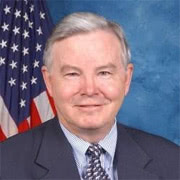The American Gaming Association has said, “Thanks, but no thanks” to the Barton bill, a piece of legislature currently striving to be passed into law sometime before the end of the year, saying that instead, they’re working on their own bill. The Internet Gambling Prohibition, Poker Consumer Protection, and Strengthening UIGEA Act of 2011, or Barton bill, as it’s more commonly called, aims to restore online poker in the United States through creation of more government and handing over more power to Big Brother, and the AGA seems to think that they can do better.
 The Barton bill has gotten a great deal of attention since it was first introduced before the House of Representatives by Texas Republican (let’s be honest– he’s a Tea Partier) Joe Barton in late June. The bill has been lauded as the great salvation of online poker by Americans desperate to play and online poker sites desperate for the customers in the United States, but some people are taking a second look and realizing that there’s something a little bit off about the bill (and not just that it was introduced by Joe Barton, which is enough to make most sensible people wary).
The Barton bill has gotten a great deal of attention since it was first introduced before the House of Representatives by Texas Republican (let’s be honest– he’s a Tea Partier) Joe Barton in late June. The bill has been lauded as the great salvation of online poker by Americans desperate to play and online poker sites desperate for the customers in the United States, but some people are taking a second look and realizing that there’s something a little bit off about the bill (and not just that it was introduced by Joe Barton, which is enough to make most sensible people wary).
The truth is, it’s refreshing that the AGA has come forward to state that they’re going to hold out for something more sensible. While the AGA statement has said that they “are pleased that Rep. Barton wants to protect American consumers and understands the need for regulating online poker in our country,” the AGA’s president and chief executive officer, Frank Fahrenkopf, has stated that the AGA will be introducing their own bill, once the kinks are worked out.
One of the fundamental differences between the two positions seems to be whether or not states are automatically opted-in to the new online gambling policies. While this may seem insignificant, it’s actually an incredibly important issue in the United States, which has waged wars over the argument of states’ rights vs. federalism. Allowing– nay, forcing– each state to decide in the beginning where they stand on the issue of online poker means that Barton’s suggested federal agency that oversees online poker becomes not only unnecessary, but borderline unconstitutional. Since some states will most likely opt out (such as Utah), and others will assuredly opt in (including those with high Native American populations, where casinos generate a large amount of income for the tribes, moreso if they can eventually go online), regulating online poker becomes the responsibility of the state, not the federal government.
The bill supported by the AGA also allows for federal regulation where taxation is concerned (and state government as well, in states that have a state income tax), as online poker winnings will be subject to taxation. Barton’s bill, however, suggests instead that the federal government will receive funding not only through taxation, but through the application of fees and fines for users (without setting limits for what those fines or fees can be). The Barton bill is filled with holes and loopholes that consistently take away authority from both individuals and states and slowly give it to the federal government; the American Gambling Association has had the foresight to not only recognize this, but actively oppose it.
More federal regulations around online poker are not what the United States needs; a worthwhile bill will involve effective regulations that protect players without blocking international commerce where poker playing is concerned.